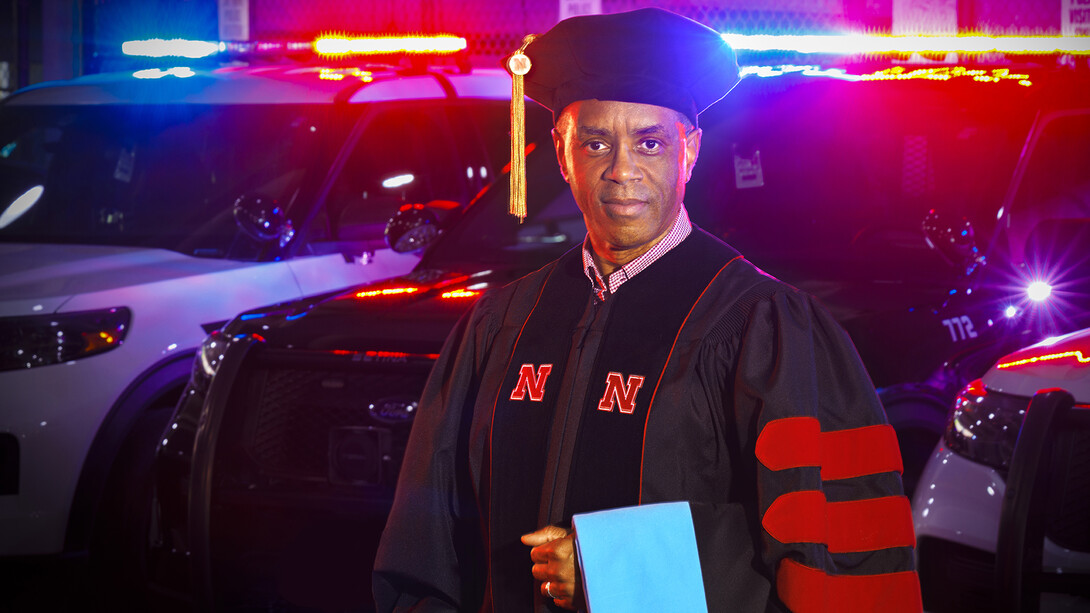
After a successful doctoral dissertation defense earlier this semester, Nebraska’s Hassan Ramzah has endured some light ribbing regarding his future title.
In small celebrations of the achievement, campus leaders have paused meetings to ask how the University of Nebraska–Lincoln’s Chief of Police and assistant vice chancellor would like to be addressed.
Dr. Chief? Chief Dr.? Dr. Chief Assistant VC?
“I’ve told everyone that all of that is not necessary, nothing has changed,” Ramzah said. “I like to be called, ‘Hassan.’”
A simple solution for a man whose career has been shaped by serving others and forging community connections.
Ramzah, a first-generation college student, will be among the more than 450 Huskers earning master and doctoral degrees during graduate commencement exercises at 3 p.m. May 17 at Pinnacle Bank Arena. The ceremony will complete a degree journey that started in 2019, shortly before Ramzah was appointed the university’s interim chief of police.
“When I shifted from municipal policing to working at the university, I wanted to better understand the higher education environment,” Ramzah said. “I wanted to become more familiar with ways that police can best serve students, faculty and staff. That is what led me to earn this degree.”
Originally from Detroit, Ramzah is a law enforcement veteran with nearly 35 years of experience, coupled with an additional six years of active duty in the U.S. Army. Before joining UNL as assistant police chief in 2016, he worked for 26 years in the Wichita, Kansas, police department, starting as a patrolman and advancing to deputy police chief.
A focus of his career has been community policing — a model in which community members and police engage more often and share in identifying and preventing problems that impact overall safety and order. It’s an approach that Ramzah has fully integrated into all UNLPD activities and served as the focus of his dissertation.
“In the 1990s, I was one of the very first community policing officers in the Wichita Police Department,” Ramzah said. “It was something I wanted to be a part of, an opportunity to do something new, police in a different way. And, it gave me the opportunity to be someone who supported the building of relationships within the community, particularly with youth.”
The approach has led to various successes in Ramzah’s career — from establishing an after-school program in Wichita to connecting in positive ways with students at UNL.
“Community policing is a philosophy. It’s a focus on problem-solving, relying on a collaborative effort, and it’s also a very proactive approach to campus safety,” Ramzah said. “At UNLPD, we take the position where we’re active members of the campus community and we interact daily, not as outsiders, but as collaborators and as partners.”
Ramzah’s dissertation, “A Collaborative Campus Community Policing Model: A Case Study in Fostering Collective Efficacy Among Students, Faculty and Staff,” is one of a few in-depth case studies of community policing in higher education.
To complete the study, Ramzah partnered with a police department at another university in the Midwest. It addresses multiple questions centered around the theory that a collective efficacy — trust and solidarity among residents of a community — can reduce crime.
“It is really concerned with relationship building and the interactions police have with students, faculty and staff, and the outcomes of those interactions,” Ramzah said. “It also examines how policing programs and initiatives can support perceptions of safety and collaborative partnerships.”
Ramzah hopes the dissertation will be used to further the understanding of community policing and its potential for positive outcomes. He may pursue publication in an academic journal and hopes to use it as the basis for professional presentations in the future.
For now, Ramzah is focused on helping the university complete plans for a safe and successful commencement weekend.
“Earning my doctorate has been an incredible journey — it’s been my life outside of work,” Ramzah said. “Every time I had a little bit of free time, from between sessions at conferences to time on family vacations, I would write a little bit of the dissertation.
“I’ve had incredible support from my family and the campus community. But, honestly, it’s been so busy on campus that it has been hard to compartmentalize what all of this means. I think after the semester ends, I’ll get a better handle on it all and we’ll celebrate.”







